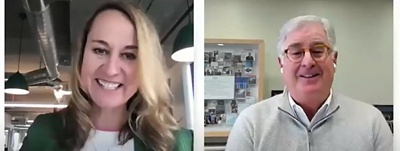On His Advice for HR Leaders as They Look Around the Corner:
“What’s required as we go to this next phase—the data enterprise phase—is doing it intelligently and smartly, versus just chasing rapid growth. HR leaders need to think about the knowledge level of their enterprise in this area—the responsible use of data, the ethical use of data, and best practices around the use of this data. Do you have a literate organization when it comes to this? When you have a meeting in your organization and you have your chief revenue officer, your top lawyer, and the HR leader saying, ‘Give us a definition for bias in data,’ do you have agreement on that definition? So it’s this shared understanding.
“下一个点是是否你有钥匙leadership skills. What are the right leadership skills, strategy skills, management talent, and management systems? And what is the culture? People say, ‘We’re just going to hire all these data scientists.’ Well, what are you going to do about displacement in your workforce, and how do you deal with that cultural transformation? We use the term augmented intelligence. Give them more tools to work with versus saying, ‘I’ll hire these people, and I’ll get rid of others who can’t make that transition.’ Established companies have to work through those transitions: leadership skills, the culture of the company, education, raising data literacy. And if these tools and techniques, which are wonderful to help us solve massive problems for society, are not implemented appropriately, then we’re going to have ethical issues, regulation issues, and those kinds of challenges that companies would really rather avoid.”
On His Hopes for Technology Collaboration in the Future:
“The thing I’m most hopeful about is in this data world, we come up with responsible principles and best practices that take advantage of the benefits to society. Right now, there are 300 pending regulations around the world around the responsible, ethical use of data and privacy protection and the individual rights of data. They are very, very key.
“However, think about problems that have been solved with collaboration and the sharing of information. Take the pandemic and vaccines. It can take four to five years to get this kind of vaccine out into the market at scale. [Pharmaceutical companies] did it in less than a year, right? So all those friction points were knocked down. They shared all that information, all the learnings, all the research.
“Climate change is the same sort of thing. There are all these scientific models on climate change. They’re not all in agreement, but it doesn’t matter. The macro trends are there. But if we got true collaboration around the world that built models that were credible, that people could buy into, we could begin this transition.
“There’s tremendous opportunity for the responsible use of this data, and we ought to address it and solve some of the world’s biggest challenges.”







